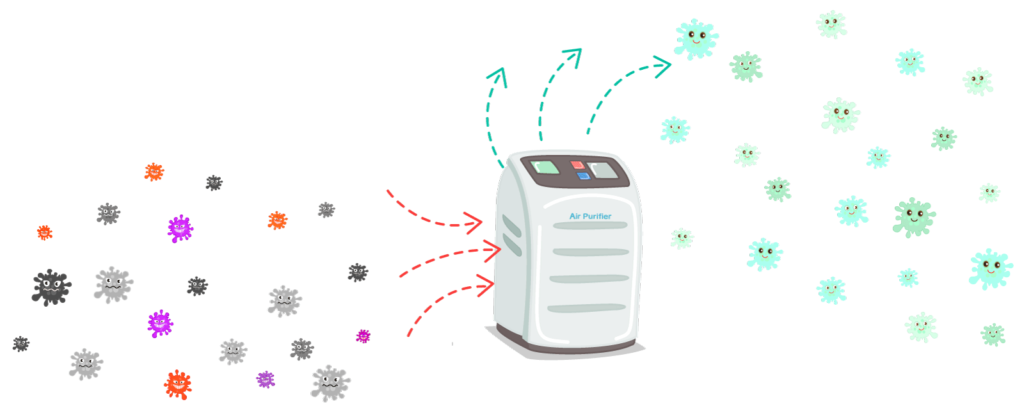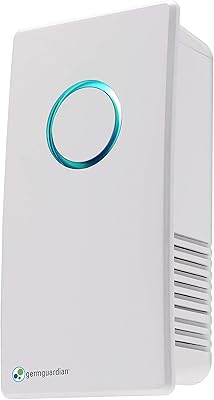When we think about sanitizers, we think about the liquids that we spray on surfaces or wipe onto our hands to protect us from germs and bacteria. But what about air sanitizers?

What Are Air Sanitizers And Do They Help?
Air Sanitizers do much the same job of liquid sanitizers by aiming to eliminate airborne viruses, molds, and spores, creating clean and breathable air.
Most air sanitizers use UV light to eliminate these microscopic particles, though other technologies exist.
Whether they help or not depends on what you want them to do.
They will not filter out airborne contaminants like an air filter or purifier will. Instead, they will target the smaller germs and bacteria.
If you are worried about the things that can attack the body and promote illness, then, yes, they do help.

Difference Between Air Sanitizer & Air Purifier
Air sanitizers and air purifiers both have the same goal: to purify the air around them. The main difference is that they purify the air of different things.
An air filter or purifier will draw air through and trap larger particles inside. This includes things such as dust and pollen.
With an air sanitizer, you are drawing in and capturing the viruses, bacteria, and mold, among other things.
One way to think about it is to compare dusting to sanitizing. You might clean one surface with furniture polish and the other with a bleach cleaner. You are using both liquids to clean the surfaces, but both do so in different ways.
Types of Air Sanitizers
When you are looking for an air sanitizer, you are going to find that most of them work with UV light, though there are some other options. The one that you choose may depend on what else you want the sanitizer to do.
· UV Air Sanitizers
As you may have guessed, UV air sanitizers use UV light to kill off germs, viruses, and bacteria (and much more).
Hospitals have used UV lights to disinfect rooms and laboratories for years, and it was a natural progression to use this technology in the home too. The UV light kills off the pathogens by breaking down the molecular bonds.
The air in your home is passed through a chamber that is flooded with UV light. The air that emerges will have at least some of the bacteria removed, and over time, the air that circulates through the room will become more and more diluted with fresh and clean air.
Be sure to replace the bulb every year for the best results.
· Ionic Air Sanitizers
Ionic air purifiers emit negative ions into the air. These negative ions bond with positively charged particles and the resulting particles are so heavy that they drop from the air.
Some air purifiers have metal plates inside that will trap these particles, while others rely on the fact that the airborne particles are not airborne anymore.
Most ionic air sanitizers are large, though they do not make any noise when operational.
· Electronic Air Sanitizers
This is a solution for your entire home and will be installed as part of your furnace or air conditioning system, so most need to be professionally installed.
These air sanitizers use a combination of HEPA filters to remove the larger particles from the air and positive ions to zap the smaller particles, such as viruses and bacteria.
These systems need to be cleaned monthly, though that is a relatively easy process.

The Best Air Sanitizer
CocoCube Car Air Purifier
www.amazon.com/CocoCube-Car-Air-Purifier-Activated/dp/B09MR8X97T

The Coconut Air CocoCube Car Air Purifier is perfect for small spaces like inside a vehicle. It’s got 2x HEPA Filters and a 12.80mm Activated Carbon bed between them (no competitor we’ve ever seen has this much activated carbon!). Plus it’s made with maglev fans so it’s completely silent. This is one seriously high-end air purifier for when you need really clean air. Plus, this car air purifier is tiny. This is our #1 pick for clean air.
Popular Articles on ComproGear
Best Compression Socks for Sitting All Day Should You Wear Compression Socks if You Sit All Day?
Guardian Technologies UV Sanitizer
www.amazon.com/GermGuardian-Purifier-Sanitizer-Allergens-Guardian/dp/B07GBL679N/

There are many UV air sanitizers out there, and this is one of the best. Not only does it use UV light to destroy bacteria and germs, but it also has a HEPA filter that will also remove the larger pollutants, dust, and allergens.
There is a charcoal filter included, too, which helps to remove odors from the room. This includes odors from pets, smoke, kitchen smells, and most other bad odor that you have around the home.
The air sanitizer works on mains power and will cover medium to large rooms (up to 743 sq. ft). There is also a speed setting, so you can decrease the speed based on the room size to create more efficiency.
GermGuardian UV-C Air Sanitizer

For a more compact air sanitizer, the Germ Guardian is small and efficient. This pluggable air sanitizer will not take up much room in your home, and you will not even heart it when plugged in. The device is perfect for smaller rooms and will do most that the previous sanitizer will, only on a smaller scale.
The device does not come with a filter, meaning that it does not filter as much from the air, but this also means that you do not need to replace the filter either. It will still remove bacteria and germs from the air, along with eliminating unwanted smells.

Benefits of Air Sanitizers
· Germ Removal
The main benefit of an air sanitizer is the removal of airborne germs. Bacteria and viruses are all around us, and, thankfully, our body is able to deal with most, but there are some that can attack us, and air sanitizers can take care of them before they enter our bodies.
· Limits Mold Growth
Bacteria, viruses, and mold are in the air around us, but they need time to multiply before they can attack. By stopping these microbiological organisms from multiplying, an air sanitizer will render them useless.
· Fights Odors
The air quality is improved by removing allergens from the air, and any nasty scents are removed. You are left with fresh air that smells clean.
· Non-Chemical
Some people are sensitive to the harsh chemicals that clean and sanitize, while others want a more natural approach to air cleanliness. Air sanitizers provide a non-chemical way to sanitize your home.

What To Look For In An Air Sanitizer
· Size
Before buying an air sanitizer, you need to know the size of the area that you are sanitizing. If you use a small air sanitizer in a large room, it is going to be worthless, and you are not going to have sanitized air.
Measure the size of the room, home, or area, and choose an air sanitizer that can handle it.
· Power
Most air sanitizers run on mains power and will plug into any standard outlet. But, what happens if you do not have a power source?
There may be times when you need a standalone air sanitizer. Perhaps you want one in a room with no outlets, or somethign for your car.
Battery-powered air sanitizers are out there and can be useful in many situations.
· Other Filters
Air sanitizers remove the bacteria, germs, and viruses from the air, but that does not mean that they cannot do more. If you want your air sanitizer to filter out pet hair, or remove strong odors, look for HEPA and charcoal filters.
· Noise
While most air sanitizers work silently, some may produce noise when they are in operation. This is usually when you add in more features and are filtering out more than only germs. If you need your air sanitizer to do more, try to find a balance between noise and function.

Do Air Sanitizers Prevent Coronavirus?
Coronavirus, as the name might suggest, is a virus. Since an air sanitizer is designed to remove viruses from the air, it can work to help combat Coronavirus. But, that does not mean that it can prevent Coronavirus.
With Coronavirus, we are advised to clean and sanitize our hands and the surfaces around us. Masks are also worn to stop the spread, and this is said to be because the virus is contained in the water droplets that we expel through the mouth and nose.
Looking at this particular virus, cleanliness can certainly stop the spread of the virus, but that does not mean it will eliminate it.
While an air sanitizer will help to remove the Coronavirus from the air, it cannot be said that any type of air purifier will remove it completely, so an air sanitizer should not be used as a sole defense against Coronavirus.

Tips for Maintaining Good Air Quality
While an air sanitizer will help to maintain the air quality in your home, it should not be relied on solely. Any air purifier should be used in conjunction with basic cleanliness.
Here are some tips for improving air quality alongside your air sanitizer.
- Maintain cleanliness by regularly cleaning and sanitizing your home.
- Remove any sources of irritants (for example, a pet that causes allergies)
- Remove clutter to stop dust and allergens from collecting.
- Replace filters regularly in any air purifiers.
- Replace bed sheets and other furniture covers often.
- Vacuum rugs, carpets, curtains, and furniture regularly.
- Remove greenery (they can often be a source of mold).
- Allow fresh air to circulate into your home when you can.
Our #1 Pick for an air sanitizer is the Coconut Air CocoCube Car Air Purifier.